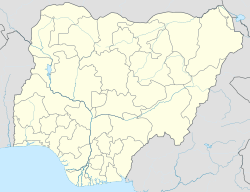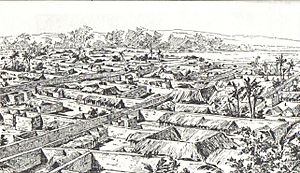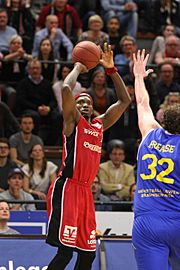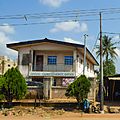Benin City facts for kids
Quick facts for kids
Benin City
|
||
|---|---|---|
|
City
|
||
| Benin | ||
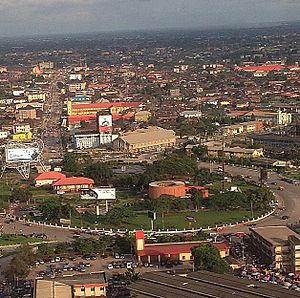
Aerial view of Benin City
|
||
|
||
| Country | ||
| State | ||
| Area | ||
| • Total | 1,204 km2 (465 sq mi) | |
| Population
(2016)
|
||
| • Total | 1,496,000 | |
| • Rank | 4th | |
| • Density | 1,242.5/km2 (3,218.1/sq mi) | |
| GDP (PPP, 2015 int. Dollar) | ||
| • Year | 2023 | |
| • Total | $16.6 billion | |
| • Per capita | $8,700 | |
| Climate | Aw | |
Benin City is a large and important city in southern Nigeria. It is the capital of Edo State. In 2006, it was ranked as the fourth-largest city in Nigeria, after Lagos, Kano, and Ibadan.
Contents
Where is Benin City?
Benin City is located about 40 kilometers (25 miles) north of the Benin River. It is also about 320 kilometers (200 miles) east of Lagos by road. The city shares borders with other major towns in Southern Nigeria, like Agbor, Oghara, and Ekpoma.
Climate
Benin City has a tropical savanna climate. This means the weather is hot and humid all year round. It often feels very cloudy, especially from July to September.
| Climate data for Benin City (1991–2020 normals, extremes 1951–1965, 1991–2020) | |||||||||||||
|---|---|---|---|---|---|---|---|---|---|---|---|---|---|
| Month | Jan | Feb | Mar | Apr | May | Jun | Jul | Aug | Sep | Oct | Nov | Dec | Year |
| Record high °C (°F) | 40 (104) |
43 (109) |
42 (108) |
48 (118) |
39.5 (103.1) |
39.5 (103.1) |
35 (95) |
32.8 (91.0) |
35 (95) |
34.5 (94.1) |
36 (97) |
37.0 (98.6) |
48.0 (118.4) |
| Mean daily maximum °C (°F) | 33.6 (92.5) |
34.9 (94.8) |
34.4 (93.9) |
33.4 (92.1) |
32.4 (90.3) |
30.7 (87.3) |
29.0 (84.2) |
28.6 (83.5) |
29.7 (85.5) |
31.1 (88.0) |
32.9 (91.2) |
33.4 (92.1) |
32.0 (89.6) |
| Daily mean °C (°F) | 28.8 (83.8) |
29.5 (85.1) |
29.2 (84.6) |
28.7 (83.7) |
28.2 (82.8) |
27.4 (81.3) |
26.5 (79.7) |
26.3 (79.3) |
26.8 (80.2) |
27.5 (81.5) |
28.4 (83.1) |
28.7 (83.7) |
28.0 (82.4) |
| Mean daily minimum °C (°F) | 23.0 (73.4) |
24.6 (76.3) |
24.8 (76.6) |
24.5 (76.1) |
24.1 (75.4) |
23.4 (74.1) |
23.0 (73.4) |
22.8 (73.0) |
22.9 (73.2) |
23.1 (73.6) |
23.7 (74.7) |
22.9 (73.2) |
23.6 (74.5) |
| Record low °C (°F) | 12.8 (55.0) |
13.3 (55.9) |
18.3 (64.9) |
19.4 (66.9) |
19.4 (66.9) |
18.3 (64.9) |
16.7 (62.1) |
16.1 (61.0) |
18.9 (66.0) |
18.9 (66.0) |
15.6 (60.1) |
11.0 (51.8) |
11.0 (51.8) |
| Average precipitation mm (inches) | 19.4 (0.76) |
55.7 (2.19) |
126.2 (4.97) |
192.5 (7.58) |
238.9 (9.41) |
300.6 (11.83) |
336.5 (13.25) |
304.1 (11.97) |
352.4 (13.87) |
266.5 (10.49) |
100.5 (3.96) |
24.2 (0.95) |
2,317.5 (91.24) |
| Average precipitation days (≥ 1.0 mm) | 1.2 | 3.7 | 7.7 | 10.5 | 12.2 | 15.6 | 18.7 | 17.7 | 18.2 | 16.3 | 7.0 | 2.2 | 131.0 |
| Average relative humidity (%) | 75.0 | 80.4 | 86.9 | 89.8 | 90.9 | 91.7 | 91.4 | 90.6 | 91.6 | 91.1 | 86.5 | 77.9 | 87.0 |
| Mean monthly sunshine hours | 179.8 | 178.0 | 173.6 | 177.0 | 176.7 | 144.0 | 99.2 | 89.9 | 81.0 | 148.8 | 192.0 | 213.9 | 1,853.9 |
| Mean daily sunshine hours | 5.8 | 6.3 | 5.6 | 5.9 | 5.7 | 4.8 | 3.2 | 2.9 | 2.7 | 4.8 | 6.4 | 6.9 | 5.1 |
| Source 1: NOAA | |||||||||||||
| Source 2: Deutscher Wetterdienst (sun 1951–1965) | |||||||||||||
What Benin City is Known For
Benin City is a major hub for Nigeria's rubber industry. Palm oil production is also a very important business here.
The city was once the main center of the powerful Kingdom of Benin, which thrived from the 1200s to the late 1800s. This kingdom had strong trade links with Portugal for many years.
In 1897, British forces captured and burned the city. Many beautiful bronze sculptures from the Benin City palace, known as the Benin Bronzes, were taken by the British. After this, the British gradually took control of the area, making it part of Colonial Nigeria.
The native people of Benin City are the Edo people, also called the Benin People. They speak the Edo language or Bini Language. The Edo people are famous for their rich dress culture, especially their beads, body marks, bangles, and anklets. These beads often show royalty and are important during traditional weddings. They also farm crops like yam, plantain, and cassava.
History of Benin City
The Edo People and Their Kingdom
The Edo people are the original founders of the Kingdom of Benin. Their first rulers were called the Ogiso (meaning "King of the sky"). The land was originally known as Igodomigodo.
The first Ogiso, Igodo, was a popular and good ruler. After him, his eldest son, Ere, became king. Later, a power struggle happened between the last Ogiso's wife and his son, Prince Ekaladerhan. The prince was wrongly accused and sentenced to death, but the men sent to kill him let him go.
Prince Ekaladerhan went into exile and changed his name to Izoduwa, meaning "I have found prosperity." Meanwhile, in Benin, the elders searched for the banished prince. He refused to return because of how he was treated. Instead, he sent his son, Ọranmiyan, to rule in his place.
Ọranmiyan married a local lady named Ẹrinmwide, and they had a son. After some years, Ọranmiyan decided to leave. He called the land Ile-Ibinu, meaning "land of vexation," and said only a child raised in the local traditions could rule. This name later became "Ubinu," which the Portuguese changed to "Benin."
Ọranmiyan's son, Ẹwẹka I, became the first Oba (king) of the current ruling family. Around 1470, Oba Ẹwuare changed the name of the state to Ẹdo. Both the Yoruba and Edo traditions agree that Prince Ọranmiyan of Ife founded the Oba dynasty in Benin City.
The Benin Kingdom began to expand its power in the late 1200s under Oba Ewedo.
European Contact and British Rule
The Portuguese first visited Benin City around 1485. The city became wealthy in the 1500s and 1600s through trade within southern Nigeria and with Europeans. They traded goods like pepper and ivory.
In the early 1500s, the Oba sent a representative to Lisbon, Portugal. The King of Portugal then sent Christian missionaries to Benin. Even in the late 1800s, some people in Benin could still speak a mix of Portuguese. Many Portuguese words can still be found in the local languages today.
A Portuguese captain described the city in 1691 as "larger than Lisbon; all the streets run straight and as far as the eye can see. The houses are large, especially that of the king, which is richly decorated and has fine columns. The city is wealthy and industrious. It is so well governed that theft is unknown and the people live in such security that they have no doors to their houses."
On February 17, 1897, Benin City was captured by the British. This event, known as the "Punitive Expedition," involved a British force of 1,200 soldiers. They captured, looted, and burned the city after a previous British group was attacked.
During this expedition, many valuable "Benin Bronzes" were taken from the Benin City palace. These artworks include figures, busts, and groups made from iron, carved ivory, and especially brass. Many of these artifacts are now in museums in Western countries. In recent years, there have been calls for these artifacts to be returned to Nigeria. One famous piece, the Queen Idia mask, was used as a symbol for the Second Festival of Arts Culture (FESTAC '77) in Nigeria in 1977.
The capture of Benin helped the British colonize the area. It eventually led to the region becoming part of Colonial Nigeria. The British allowed the Benin monarchy to be restored in 1914, but the real political power remained with the British colonial government.
Nigerian Independence
After Nigeria gained independence from British rule in 1960, Benin City became the capital of the Mid-Western Region in June 1963. When the region was renamed Bendel State in 1976, Benin City remained its capital. In 1991, when Bendel State was divided into Delta State and Edo State, Benin City became the capital of Edo State.
Education
Benin City is home to several important schools and universities in Nigeria.
Some of the universities include:
- University of Benin
- Ambrose Alli University (located in Ekpoma)
- College of Education Ekiadolor
- Igbinedion University
- Benson Idahosa University
- Wellspring University
- Edo State Polytechnic (in Usen)
- Edo State University, Uzairue
- Auchi Polytechnic (in Auchi, Edo State)
There are also many secondary schools in Benin City, such as Edo College, Edo Boys High School, and Imaguero College. Vocational schools like Micro International Training Center also offer specialized training.
Environmental Challenges
Climate Change Effects
Scientists have observed changes in Benin City's climate, including increases in temperature, humidity, and rainfall between 1981 and 2015.
Flooding
Benin City often experiences flooding. Studies have shown this problem since at least 1993. Experts suggest ways to improve flood management, such as better control over building and land use. They also recommend community programs to help the city adapt and prepare for disasters. In June 2020, many people lost their homes due to city flooding. Residents blamed poor storm drains and a lack of ongoing flood prevention programs.
Urban Heat
The city itself is, on average, about 0.5 degrees Celsius warmer than the surrounding rural areas. This temperature difference is even bigger during weekdays.
Waste Management
A 2021 study in the journal Nature found that Benin City has not met the standards for waste management set by the Edo State Waste Management Board. The study surveyed many residents and found that most did not understand proper waste management or how it connects to issues like greenhouse gas emissions. Another study showed that most residents were unaware of the health problems caused by poor waste management.
Culture and Traditions
Benin City has many interesting attractions. These include the National Museum, the Oba Palace, and Igun Street, which is famous for its bronze casting and metal artworks. Other attractions are various festivals, the ancient Benin Moats (large ditches), the King's Square (also called Ring Road), and the city's traditional markets.
The Bini people are well-known for their bronze sculptures and their skills in art and crafts. Benin City is also home to one of the oldest ongoing monarchies in the world. Many festivals are held each year to celebrate historical events and seasons.
Festivals
The Igue festival is a popular annual event in Benin City. It marks the start of the new year and is a very important part of the local culture. People believe the festival renews the Oba Ewuare's special powers. It usually takes place between Christmas and New Year. The festival includes the Oba blessing the land and his people.
Benin City also hosts the Benin City Film Festival. This festival helps promote films made by local filmmakers and showcases works from new national and international filmmakers. It gives them a chance to connect with experienced people in the film industry.
Other Traditions
- Vadoo day: This event happens every January 10th and is observed by the people of Benin.
- Quintessence Film Festival
- Gelede Festival
- Waba Festival
- International Festival of the Dahomean Culture.
Bini Market Days
The "Bini" people have four special market days: Ekioba, Ekenaka, Agbado, and Eken.
Getting Around
Benin Airport serves the city. Five commercial airlines fly to it, including Green Africa Airways, United Nigeria Airlines, Aero Contractors, Arik Air, and Air Peace.
Notable People from Benin City
- Godwin Abbe, former Nigerian Minister for Interior and Defence
- Ambrose Folorunsho Alli, former governor of the defunct Bendel State. He created the Bendel State University now named after him as "Ambrose Alli University"
- Eghosa Asemota Agbonifo, politician
- Anthony Anenih, chairman, the board of trustees (PDP) and Nigeria's former Minister of Works
- Suleiman Braimoh (born 1989), Nigerian-American basketball player
- Archbishop John Edokpolo, Minister of Trade and Founder of Edokpolor Grammar School
- Francis Edo-Osagie, businessman
- Jacob U. Egharevba, Bini historian and traditional chief
- Anthony Enahoro, activist and politician who fought against colonial rule and for democracy
- Festus Ezeli, basketball player
- Abel Guobadia, former chairman of Nigeria's Independent National Electoral Commission
- Ovia Idah, Nigerian sculptor
- Benson Idahosa, Founder of Church of God Mission International Incorporated
- Felix Idubor, artist
- Felix Lebarty, musician
- Gabriel Igbinedion, businessman and Esama of Benin kingdom
- Divine Ikubor, known professionally as Rema, musician.
- Festus Iyayi, novelist and first African to win the Commonwealth Writers Prize
- Suleman Johnson, senior pastor and general overseer of Omega Fire Ministries International
- Godwin Obaseki, the current governor of Edo State
- Samuel Ogbemudia, former governor of the Midwest region of Nigeria and later Bendel state
- Shallipopi, singer and songwriter
- Sonny Okosun, musician
- Suyi Davies Okungbowa, African fantasy and science fiction author
- Osasere Orumwense, former vice-chancellor of University of Benin
- Osayuki Godwin Oshodin, former vice-chancellor of University of Benin
- Demi Isaac Oviawe, Ireland-based actress
- Chris Oyakhilome, founder and president of Believers LoveWorld Incorporated, also known as Christ Embassy
- Modupe Ozolua, cosmetic surgeon
- Lilian Salami, Vice-Chancellor of University of Benin
- Victor Uwaifo, musician
Images for kids
See also
 In Spanish: Ciudad de Benín para niños
In Spanish: Ciudad de Benín para niños
 | Calvin Brent |
 | Walter T. Bailey |
 | Martha Cassell Thompson |
 | Alberta Jeannette Cassell |



